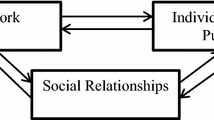Abstract
Psychological sense of community within psychosocial rehabilitation clubhouse programs was examined using concept mapping with 18 members and 18 staff from 10 programs. Members identified four concepts: Recovery, social connections, membership, and tasks and roles. Members described hope and healing as aspects of recovery. Members' views on sense of community focused on the rehabilitation and social nature of the program. Staff also identified four concepts: Affiliation and support for members, shared experiences, clubhouse organization, and task and roles. The staff concept of clubhouse organization, which incorporated the ideas of leadership and organization of physical space and the concept of task and roles, was based on ideas of shared responsibility and clubhouse procedures. Staffs' views on sense of community strongly reflected their formal training in clubhouse principles. The relation of these concepts to McMillan and Chavis' theoretical framework for sense of community is discussed and recommendations for practice provided.
Similar content being viewed by others
References
Anthony, W. A. (1993). Recovery from mental illness: The guiding vision of the mental health service system in the 1990's. Psychosocial Rehabilitation Journal, 16(4), 11–23.
Aquila, R., Santos, G., Malamud, T. J., & McCrory, D. (1999). The rehabilitation alliance in practice: The clubhouse connection. Psychiatric Rehabilitation Journal, 23(1), 19–23.
Beard, J. H., Propst, R. N., & Malamud, T. J. (1982). The fountain house model of psychiatric rehabilitation. Psychosocial Rehabilitation Journal, 5(1), 47–53.
Corrigan, P. W. (2003). Towards an integrated, structural model of psychiatric rehabilitation. Psychiatric Rehabilitation Journal, 26(4), 346–358.
Corrigan, P. W., River, L. P., Lundin, R. K., Wasowski, K. U., Campion, J., Mathisen, J., et al. (2000). Stigmatizing attributions about mental illness. Journal of Community Psychology, 28(1), 91–102.
Fairweather, G. W., Sanders, D. H., & Maynard, H. (1969). Community life for the mentally ill: An alternative to institutional care. Oxford, England: Aldine.
Garcìa, I., Giuliani, G., & Wiesenfeld, E. (1999). Community and sense of community: The case of an urban barrio in Caracas. Journal of Community Psychology, 27(6), 727–740.
Gottlieb, B. H. (1985). Social support in community mental health. In S. Cohen, & L. S. Syme (Eds.), Social support and health. San Diego, CA: Academic Press.
Herman, S., Onaga, E., Pernice-Duca, F., Ferguson, C., Randall-Weaver, K., & Oh, S. (April 2003). Michigan psychosocial rehabilitation clubhouse programs: Final evaluation report. Detroit, MI: Flinn Foundation.
Hughey, J., Speer, P. W., & Peterson, N. A. (1999). Sense of community in community organizations: Structure and evidence of validity. Journal of Community Psychology, 27(1), 97–113.
Jacobson, N. (2001). Experiencing recovery: A dimensional analysis of recovery narratives. Psychiatric Rehabilitation Journal, 24(3), 248–255.
Jacobson, N., & Curtis, L. (2002). Recovery as policy in mental health services: Strategies emerging from the states. Psychiatric Rehabilitation Journal, 23(4), 333–341.
Jacobson, N., & Greenley, D. (2001). What is recovery? A conceptual model and explication. Psychiatric Services, 52(4), 482–485.
Johnsen, J. A., Biegel, D. E., & Shafran, R. (2000). Concept mapping in mental health: Uses and adaptations. Evaluation and Program Planning, 23, 67–75.
Maton, K. I. (1989). Community settings a buffers of life stress? Highly supportive churches, mutual help groups, and senior centers. American Journal of Community Psychology, 17(2), 203–232.
McMillian, D. W. (1996). Sense of community. Journal of Community Psychology, 24(4), 315–325.
McMillian, D. W., & Chavis, D. M. (1986). Sense of community: A definition and theory. Journal of Community Psychology, 14, 6–23.
McNeely, J. (1999). Community building. Journal of Community Psychology, 27(6), 741–750.
Obst, P., Smith, S. G., & Zinkiewicz, L. (2002). An exploration of sense of community, part 3; Dimensions and predictors of psychological sense of community in geographical communities. Journal of Community Psychology, 30(1), 119–133.
Propst, R. N. (1992). Standards for clubhouse programs—Why and how they were developed. Psychosocial Rehabilitation Journal, 16(2), 25–30.
Ralph, R. O., & Muskie, E. (2000). Review of recovery literature: A synthesis of a sample of recovery literature 2000. Report prepared for National Technical Assistance Center for State Mental Health Planning (NTAC) and National Association for State Mental Health Program Directors (NASMHPD).
Raush, H. L. (1968). The halfway house movement: A search for sanity. New York: Appleton-Century-Crofts.
Ridgway, P. (2001). Restorying psychiatric disability: Learning from first person recovery narratives. Psychiatric Rehabilitation Journal, 24(4), 335–343.
Sarason, S. B. (1974). The psychological sense of community. San Francisco: Jossey-Bass Publishers.
SPSS (1999). SPSS 10.0 Syntax reference guide. Chicago: Author.
Trochim, W. (1989a). Concept mapping: Soft science or hard art? Evaluation and Program Planning, 12, 87–110.
Trochim, W. (1989b). An introduction to concept mapping for planning and evaluation. Evaluation and Program Planning, 12, 1–16.
Trochim, W. (1993). The reliability of concept mapping. Paper presented at the 1993 annual conference of the American Evaluation Association, Dallas, TX. Retrieved September 30, 2002, from http://trochim.human.cornell.edu/research/reliable/reliable.htm
Turner-Crowson, J., & Wallcraft, J. (2002). The recovery vision for mental health services and research: A British perspective. Psychiatric Rehabilitation Journal, 25(3), 245–254.
Author information
Authors and Affiliations
Corresponding author
Additional information
Sandra E. Herman is now an independent program evaluation consultant.
Catherine Ferguson is now an independent consultant on psychosocial programs.
Rights and permissions
About this article
Cite this article
Herman, S.E., Onaga, E., Pernice-Duca, F. et al. Sense of Community in Clubhouse Programs: Member and Staff Concepts. Am J Community Psychol 36, 343–356 (2005). https://doi.org/10.1007/s10464-005-8630-2
Issue Date:
DOI: https://doi.org/10.1007/s10464-005-8630-2




